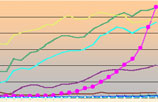New policies might stimulate, as well as stabilize, realty market
(China Daily) Updated: 2015-04-01 07:59

On Monday, 15 minutes before the end of the working day, the People's Bank of China and the Ministry of Housing and Urban-Rural Development jointly issued a document that includes favorable tax policies for realty sales and lower down payment requirements for mortgages. Comments:
Many worry that the new policies might change expectations about the realty market, thus creating bubbles again. That worry is unnecessary because currency liquidity, which is the basis of bubbles, is still non-existent thanks to conservative monetary policies. Realty prices will probably remain stable.
Beijing Times, March 31
Hours before the document was released, the shares of developers and banks sharply rose. Before analyzing the actual effect of the new policies, the question of who got the information first and purchased realty and bank shares needs answering.
It is unfair for officials to use their power to get inside information and obtain illicit income through the stock market; worse, those leaking the information are probably doing so for their own gains. We hope this case can be investigated so that the stock market will no longer serve the privileged groups only.
News Roundup, via WeChat, March 31
More important than the policies is that they show the determination of the authorities to prevent realty prices from falling continuously. This might bring some micro-stimulus to the realty market.
Zou Pingzuo, a researcher at the research institute of the People's Bank of China, March 31
By lowering the down payment requirements for mortgages, the new policies will encourage more people to buy properties. There are too many people in cities such as Beijing and Shanghai who have to crowd into small apartments as they cannot afford to purchase larger houses; now it will be easier to meet the demand.
Yan Yuejin, a researcher at E-house China R&D Institute, March 31
Whether the new policies will boost realty price depends mainly on how much influence they have on market expectations. Only when the policies are accumulated and function in the market can they change people's expectations, so it is still hard to predict whether the new policies will cause property prices to rise.
Sun Lijian, a professor in financial studies at Fudan University, March 31
Some analysts are calling the new policies a "bailout", which is actually a misunderstanding, because previously China used to implement harsh policies in order to curb soaring housing prices. A family used to have to pay 60 percent of the total price as the down payment, now authorities are loosening it to help the hosing market return to normal.
Zong Liang, a researcher at the institute of international finance at the Bank of China, March 31











